Economic Growth and Healthcare Policy under Saudi Arabia's Vision 2030
VerifiedAdded on 2023/05/29
|7
|1668
|456
Report
AI Summary
This report examines the relationship between economic growth and healthcare policies in Saudi Arabia, focusing on the context of the country's oil-dependent economy and the Vision 2030 initiative. It discusses how Saudi Arabia aims to diversify its economy and reduce its reliance on oil revenues by developing public service sectors such as healthcare, infrastructure, education, and tourism. The report highlights the government's plan to increase private sector involvement in healthcare and improve the efficiency and effectiveness of the healthcare division through digital transformation and training programs. It also addresses the strategic goals for the Ministry of Health and the Saudi Food & Drug Authority, including increasing private sector spending, improving resource utilization, and enhancing governance in the health system. The conclusion emphasizes the potential for foreign investment in specific areas and the importance of aligning with the goals of Vision 2030 to contribute to the economic and social development of Saudi Arabia.
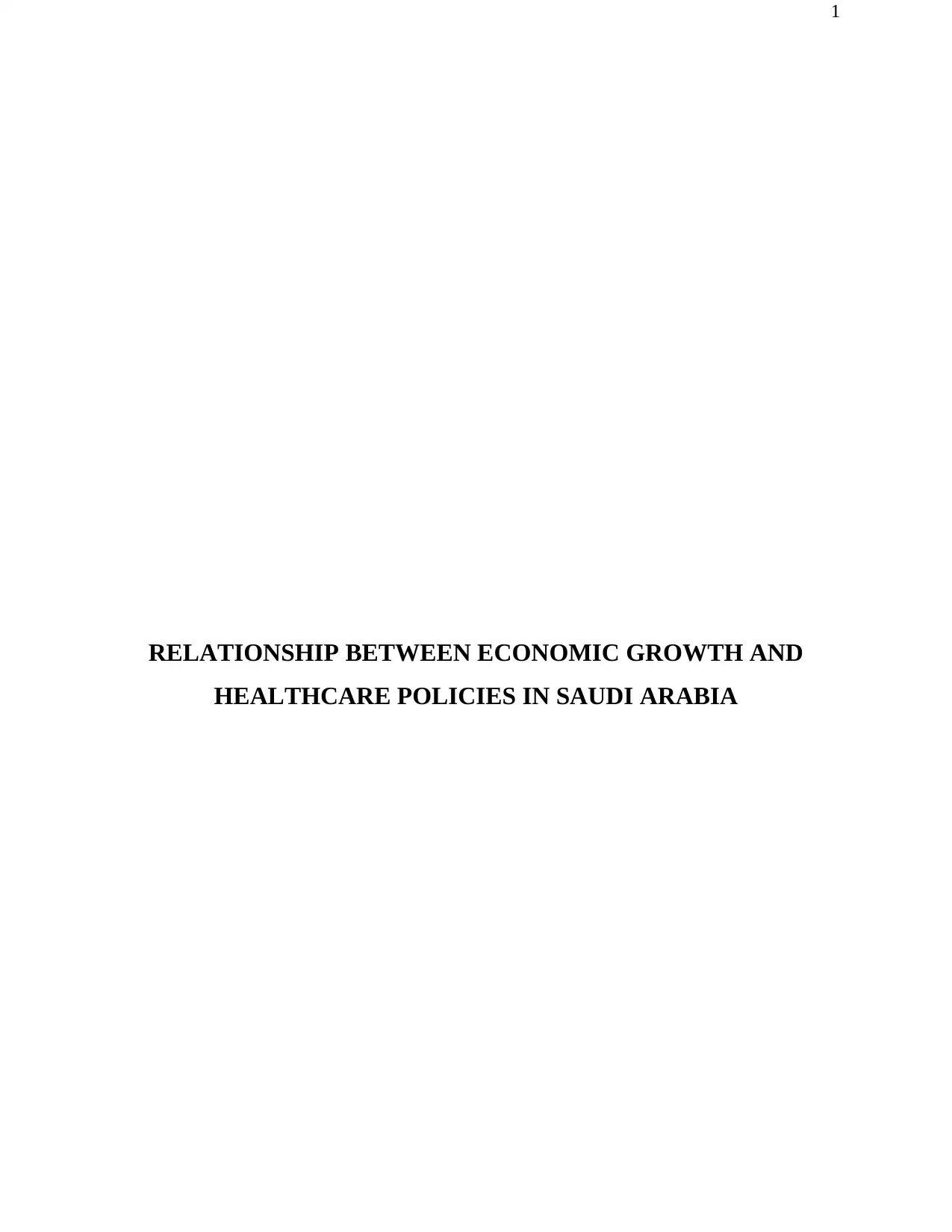
1
RELATIONSHIP BETWEEN ECONOMIC GROWTH AND
HEALTHCARE POLICIES IN SAUDI ARABIA
RELATIONSHIP BETWEEN ECONOMIC GROWTH AND
HEALTHCARE POLICIES IN SAUDI ARABIA
Paraphrase This Document
Need a fresh take? Get an instant paraphrase of this document with our AI Paraphraser
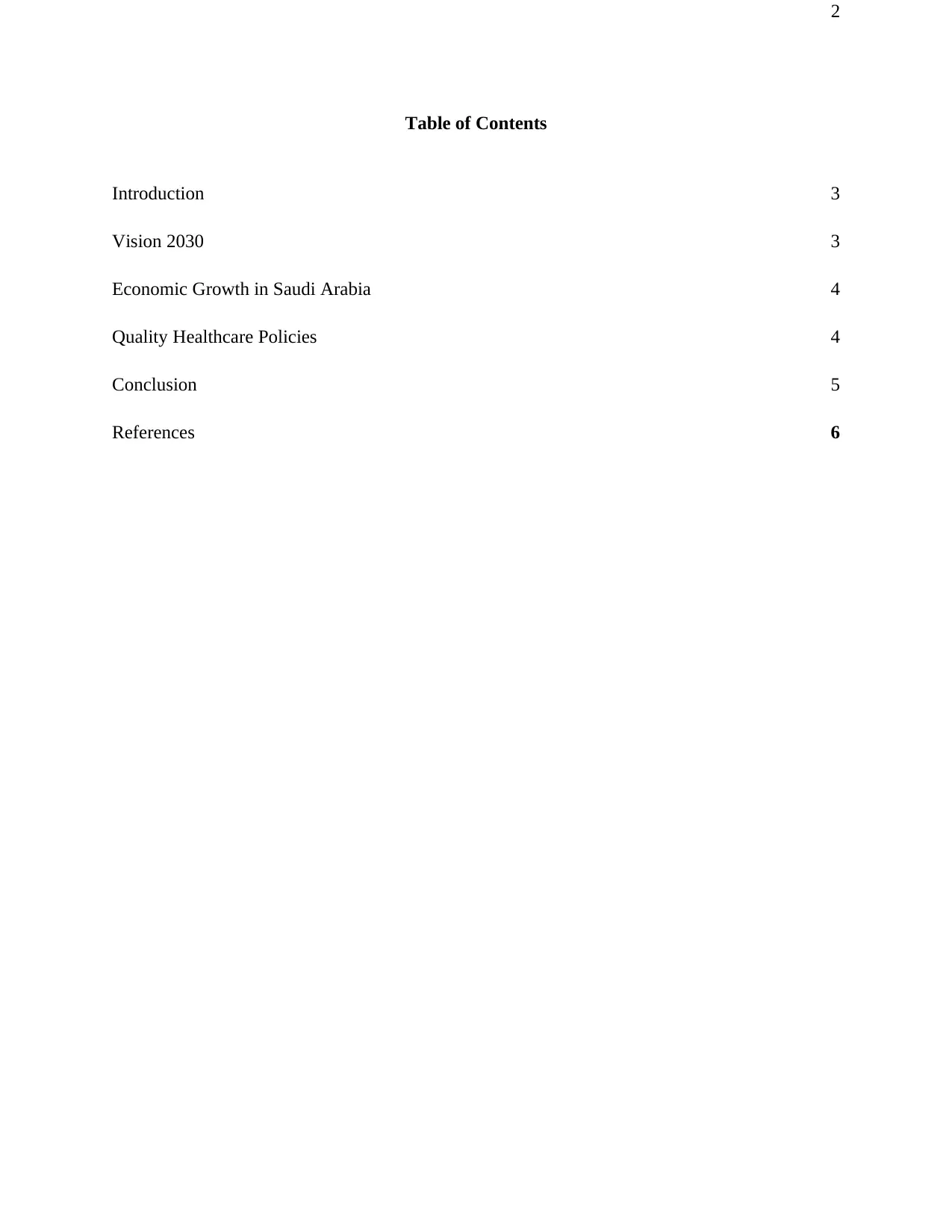
2
Table of Contents
Introduction 3
Vision 2030 3
Economic Growth in Saudi Arabia 4
Quality Healthcare Policies 4
Conclusion 5
References 6
Table of Contents
Introduction 3
Vision 2030 3
Economic Growth in Saudi Arabia 4
Quality Healthcare Policies 4
Conclusion 5
References 6
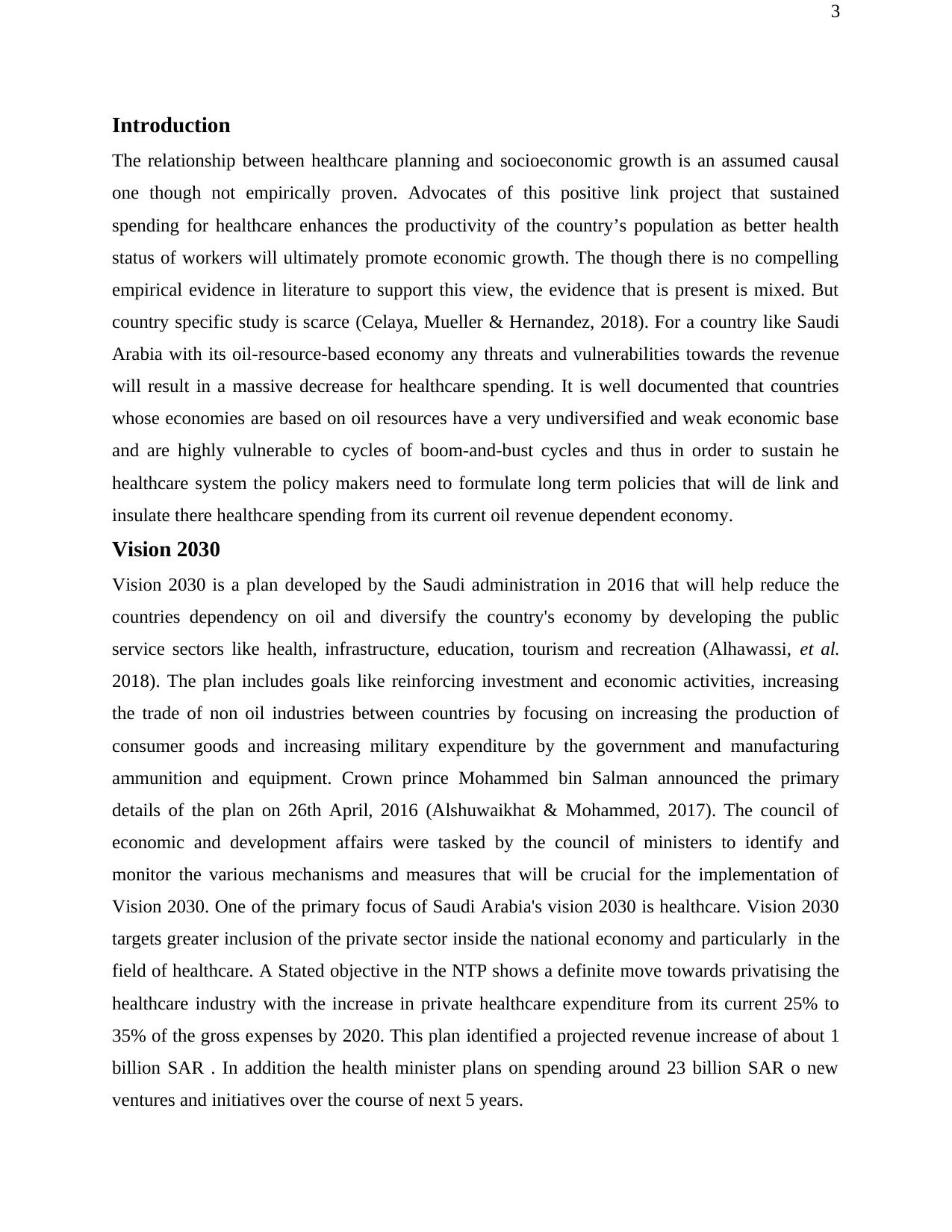
3
Introduction
The relationship between healthcare planning and socioeconomic growth is an assumed causal
one though not empirically proven. Advocates of this positive link project that sustained
spending for healthcare enhances the productivity of the country’s population as better health
status of workers will ultimately promote economic growth. The though there is no compelling
empirical evidence in literature to support this view, the evidence that is present is mixed. But
country specific study is scarce (Celaya, Mueller & Hernandez, 2018). For a country like Saudi
Arabia with its oil-resource-based economy any threats and vulnerabilities towards the revenue
will result in a massive decrease for healthcare spending. It is well documented that countries
whose economies are based on oil resources have a very undiversified and weak economic base
and are highly vulnerable to cycles of boom-and-bust cycles and thus in order to sustain he
healthcare system the policy makers need to formulate long term policies that will de link and
insulate there healthcare spending from its current oil revenue dependent economy.
Vision 2030
Vision 2030 is a plan developed by the Saudi administration in 2016 that will help reduce the
countries dependency on oil and diversify the country's economy by developing the public
service sectors like health, infrastructure, education, tourism and recreation (Alhawassi, et al.
2018). The plan includes goals like reinforcing investment and economic activities, increasing
the trade of non oil industries between countries by focusing on increasing the production of
consumer goods and increasing military expenditure by the government and manufacturing
ammunition and equipment. Crown prince Mohammed bin Salman announced the primary
details of the plan on 26th April, 2016 (Alshuwaikhat & Mohammed, 2017). The council of
economic and development affairs were tasked by the council of ministers to identify and
monitor the various mechanisms and measures that will be crucial for the implementation of
Vision 2030. One of the primary focus of Saudi Arabia's vision 2030 is healthcare. Vision 2030
targets greater inclusion of the private sector inside the national economy and particularly in the
field of healthcare. A Stated objective in the NTP shows a definite move towards privatising the
healthcare industry with the increase in private healthcare expenditure from its current 25% to
35% of the gross expenses by 2020. This plan identified a projected revenue increase of about 1
billion SAR . In addition the health minister plans on spending around 23 billion SAR o new
ventures and initiatives over the course of next 5 years.
Introduction
The relationship between healthcare planning and socioeconomic growth is an assumed causal
one though not empirically proven. Advocates of this positive link project that sustained
spending for healthcare enhances the productivity of the country’s population as better health
status of workers will ultimately promote economic growth. The though there is no compelling
empirical evidence in literature to support this view, the evidence that is present is mixed. But
country specific study is scarce (Celaya, Mueller & Hernandez, 2018). For a country like Saudi
Arabia with its oil-resource-based economy any threats and vulnerabilities towards the revenue
will result in a massive decrease for healthcare spending. It is well documented that countries
whose economies are based on oil resources have a very undiversified and weak economic base
and are highly vulnerable to cycles of boom-and-bust cycles and thus in order to sustain he
healthcare system the policy makers need to formulate long term policies that will de link and
insulate there healthcare spending from its current oil revenue dependent economy.
Vision 2030
Vision 2030 is a plan developed by the Saudi administration in 2016 that will help reduce the
countries dependency on oil and diversify the country's economy by developing the public
service sectors like health, infrastructure, education, tourism and recreation (Alhawassi, et al.
2018). The plan includes goals like reinforcing investment and economic activities, increasing
the trade of non oil industries between countries by focusing on increasing the production of
consumer goods and increasing military expenditure by the government and manufacturing
ammunition and equipment. Crown prince Mohammed bin Salman announced the primary
details of the plan on 26th April, 2016 (Alshuwaikhat & Mohammed, 2017). The council of
economic and development affairs were tasked by the council of ministers to identify and
monitor the various mechanisms and measures that will be crucial for the implementation of
Vision 2030. One of the primary focus of Saudi Arabia's vision 2030 is healthcare. Vision 2030
targets greater inclusion of the private sector inside the national economy and particularly in the
field of healthcare. A Stated objective in the NTP shows a definite move towards privatising the
healthcare industry with the increase in private healthcare expenditure from its current 25% to
35% of the gross expenses by 2020. This plan identified a projected revenue increase of about 1
billion SAR . In addition the health minister plans on spending around 23 billion SAR o new
ventures and initiatives over the course of next 5 years.
⊘ This is a preview!⊘
Do you want full access?
Subscribe today to unlock all pages.

Trusted by 1+ million students worldwide
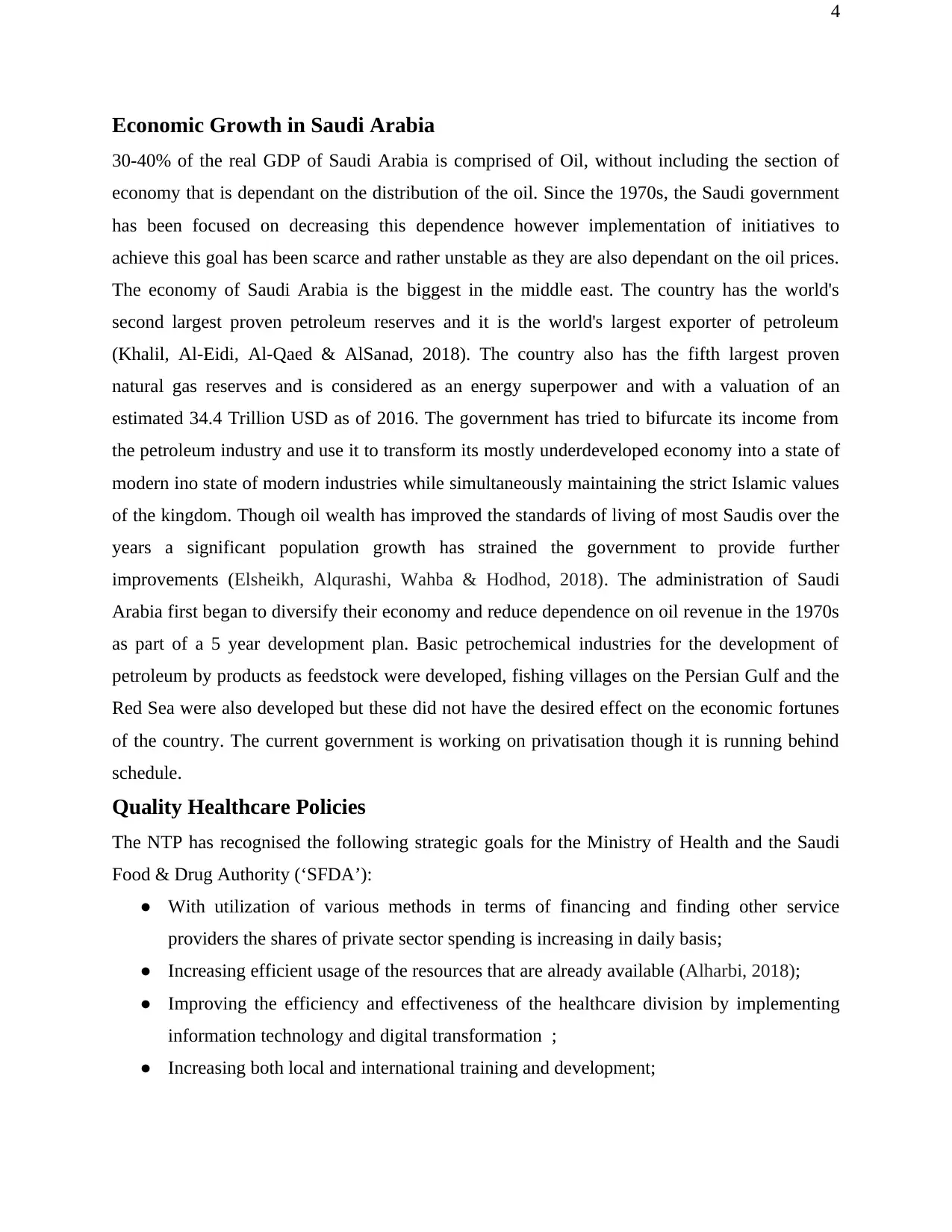
4
Economic Growth in Saudi Arabia
30-40% of the real GDP of Saudi Arabia is comprised of Oil, without including the section of
economy that is dependant on the distribution of the oil. Since the 1970s, the Saudi government
has been focused on decreasing this dependence however implementation of initiatives to
achieve this goal has been scarce and rather unstable as they are also dependant on the oil prices.
The economy of Saudi Arabia is the biggest in the middle east. The country has the world's
second largest proven petroleum reserves and it is the world's largest exporter of petroleum
(Khalil, Al-Eidi, Al-Qaed & AlSanad, 2018). The country also has the fifth largest proven
natural gas reserves and is considered as an energy superpower and with a valuation of an
estimated 34.4 Trillion USD as of 2016. The government has tried to bifurcate its income from
the petroleum industry and use it to transform its mostly underdeveloped economy into a state of
modern ino state of modern industries while simultaneously maintaining the strict Islamic values
of the kingdom. Though oil wealth has improved the standards of living of most Saudis over the
years a significant population growth has strained the government to provide further
improvements (Elsheikh, Alqurashi, Wahba & Hodhod, 2018). The administration of Saudi
Arabia first began to diversify their economy and reduce dependence on oil revenue in the 1970s
as part of a 5 year development plan. Basic petrochemical industries for the development of
petroleum by products as feedstock were developed, fishing villages on the Persian Gulf and the
Red Sea were also developed but these did not have the desired effect on the economic fortunes
of the country. The current government is working on privatisation though it is running behind
schedule.
Quality Healthcare Policies
The NTP has recognised the following strategic goals for the Ministry of Health and the Saudi
Food & Drug Authority (‘SFDA’):
● With utilization of various methods in terms of financing and finding other service
providers the shares of private sector spending is increasing in daily basis;
● Increasing efficient usage of the resources that are already available (Alharbi, 2018);
● Improving the efficiency and effectiveness of the healthcare division by implementing
information technology and digital transformation ;
● Increasing both local and international training and development;
Economic Growth in Saudi Arabia
30-40% of the real GDP of Saudi Arabia is comprised of Oil, without including the section of
economy that is dependant on the distribution of the oil. Since the 1970s, the Saudi government
has been focused on decreasing this dependence however implementation of initiatives to
achieve this goal has been scarce and rather unstable as they are also dependant on the oil prices.
The economy of Saudi Arabia is the biggest in the middle east. The country has the world's
second largest proven petroleum reserves and it is the world's largest exporter of petroleum
(Khalil, Al-Eidi, Al-Qaed & AlSanad, 2018). The country also has the fifth largest proven
natural gas reserves and is considered as an energy superpower and with a valuation of an
estimated 34.4 Trillion USD as of 2016. The government has tried to bifurcate its income from
the petroleum industry and use it to transform its mostly underdeveloped economy into a state of
modern ino state of modern industries while simultaneously maintaining the strict Islamic values
of the kingdom. Though oil wealth has improved the standards of living of most Saudis over the
years a significant population growth has strained the government to provide further
improvements (Elsheikh, Alqurashi, Wahba & Hodhod, 2018). The administration of Saudi
Arabia first began to diversify their economy and reduce dependence on oil revenue in the 1970s
as part of a 5 year development plan. Basic petrochemical industries for the development of
petroleum by products as feedstock were developed, fishing villages on the Persian Gulf and the
Red Sea were also developed but these did not have the desired effect on the economic fortunes
of the country. The current government is working on privatisation though it is running behind
schedule.
Quality Healthcare Policies
The NTP has recognised the following strategic goals for the Ministry of Health and the Saudi
Food & Drug Authority (‘SFDA’):
● With utilization of various methods in terms of financing and finding other service
providers the shares of private sector spending is increasing in daily basis;
● Increasing efficient usage of the resources that are already available (Alharbi, 2018);
● Improving the efficiency and effectiveness of the healthcare division by implementing
information technology and digital transformation ;
● Increasing both local and international training and development;
Paraphrase This Document
Need a fresh take? Get an instant paraphrase of this document with our AI Paraphraser
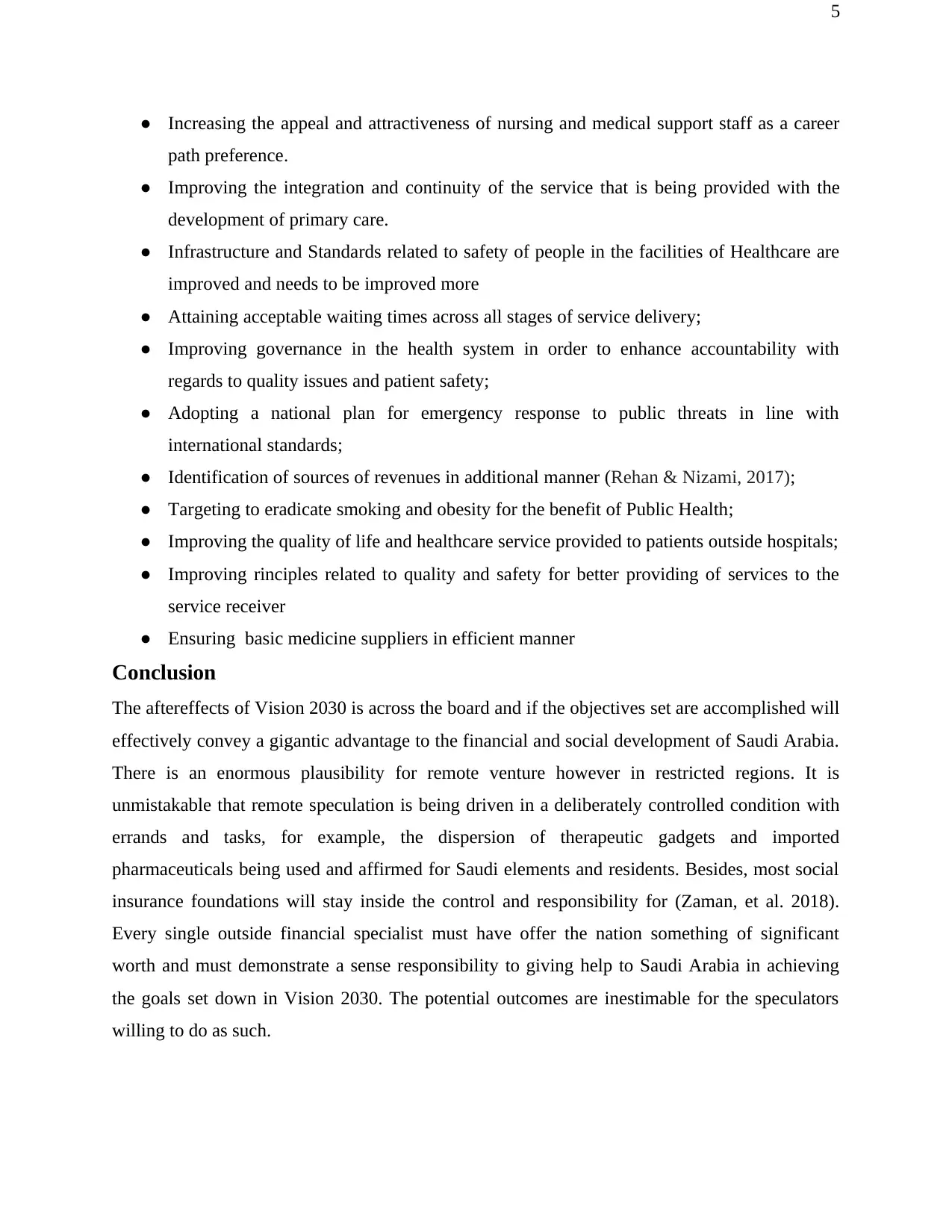
5
● Increasing the appeal and attractiveness of nursing and medical support staff as a career
path preference.
● Improving the integration and continuity of the service that is being provided with the
development of primary care.
● Infrastructure and Standards related to safety of people in the facilities of Healthcare are
improved and needs to be improved more
● Attaining acceptable waiting times across all stages of service delivery;
● Improving governance in the health system in order to enhance accountability with
regards to quality issues and patient safety;
● Adopting a national plan for emergency response to public threats in line with
international standards;
● Identification of sources of revenues in additional manner (Rehan & Nizami, 2017);
● Targeting to eradicate smoking and obesity for the benefit of Public Health;
● Improving the quality of life and healthcare service provided to patients outside hospitals;
● Improving rinciples related to quality and safety for better providing of services to the
service receiver
● Ensuring basic medicine suppliers in efficient manner
Conclusion
The aftereffects of Vision 2030 is across the board and if the objectives set are accomplished will
effectively convey a gigantic advantage to the financial and social development of Saudi Arabia.
There is an enormous plausibility for remote venture however in restricted regions. It is
unmistakable that remote speculation is being driven in a deliberately controlled condition with
errands and tasks, for example, the dispersion of therapeutic gadgets and imported
pharmaceuticals being used and affirmed for Saudi elements and residents. Besides, most social
insurance foundations will stay inside the control and responsibility for (Zaman, et al. 2018).
Every single outside financial specialist must have offer the nation something of significant
worth and must demonstrate a sense responsibility to giving help to Saudi Arabia in achieving
the goals set down in Vision 2030. The potential outcomes are inestimable for the speculators
willing to do as such.
● Increasing the appeal and attractiveness of nursing and medical support staff as a career
path preference.
● Improving the integration and continuity of the service that is being provided with the
development of primary care.
● Infrastructure and Standards related to safety of people in the facilities of Healthcare are
improved and needs to be improved more
● Attaining acceptable waiting times across all stages of service delivery;
● Improving governance in the health system in order to enhance accountability with
regards to quality issues and patient safety;
● Adopting a national plan for emergency response to public threats in line with
international standards;
● Identification of sources of revenues in additional manner (Rehan & Nizami, 2017);
● Targeting to eradicate smoking and obesity for the benefit of Public Health;
● Improving the quality of life and healthcare service provided to patients outside hospitals;
● Improving rinciples related to quality and safety for better providing of services to the
service receiver
● Ensuring basic medicine suppliers in efficient manner
Conclusion
The aftereffects of Vision 2030 is across the board and if the objectives set are accomplished will
effectively convey a gigantic advantage to the financial and social development of Saudi Arabia.
There is an enormous plausibility for remote venture however in restricted regions. It is
unmistakable that remote speculation is being driven in a deliberately controlled condition with
errands and tasks, for example, the dispersion of therapeutic gadgets and imported
pharmaceuticals being used and affirmed for Saudi elements and residents. Besides, most social
insurance foundations will stay inside the control and responsibility for (Zaman, et al. 2018).
Every single outside financial specialist must have offer the nation something of significant
worth and must demonstrate a sense responsibility to giving help to Saudi Arabia in achieving
the goals set down in Vision 2030. The potential outcomes are inestimable for the speculators
willing to do as such.
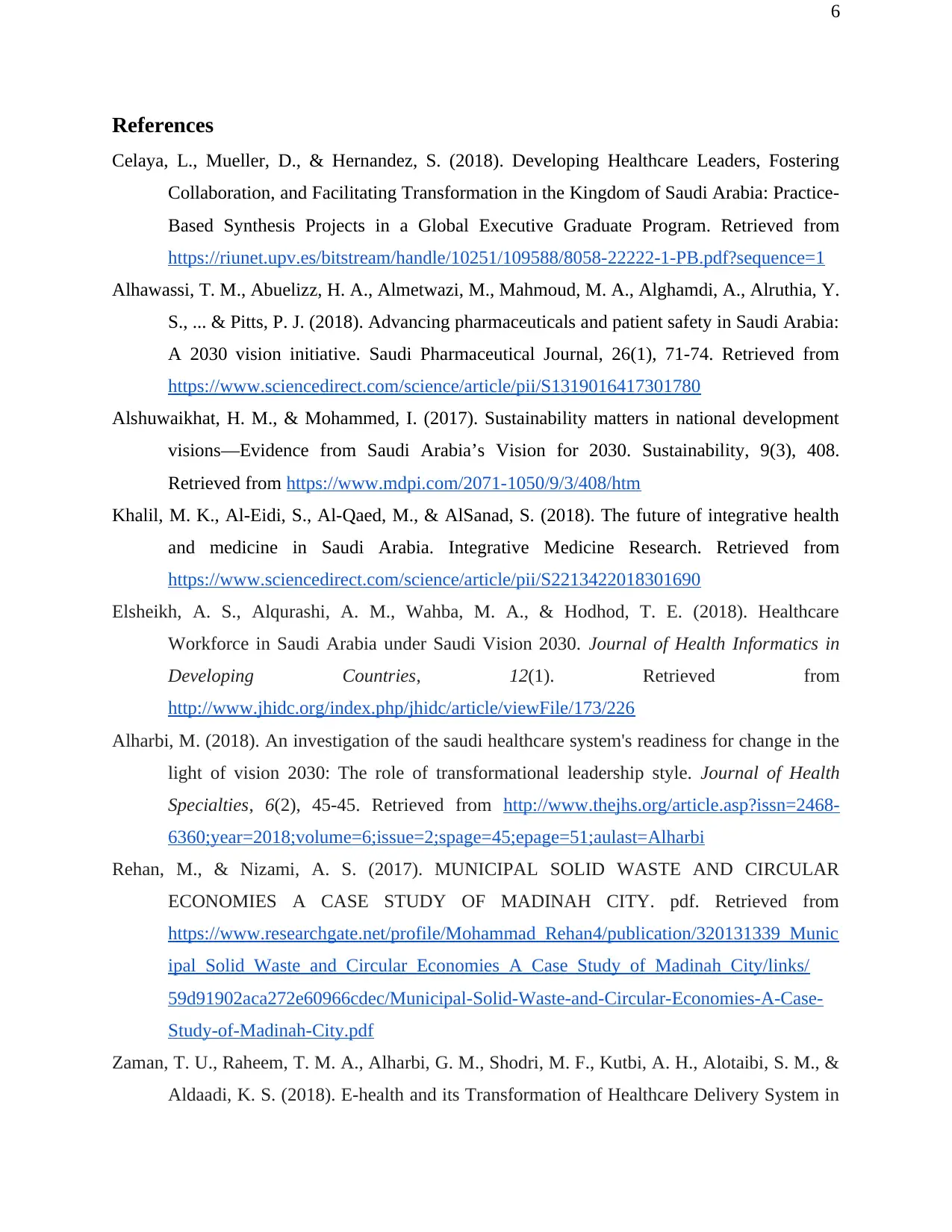
6
References
Celaya, L., Mueller, D., & Hernandez, S. (2018). Developing Healthcare Leaders, Fostering
Collaboration, and Facilitating Transformation in the Kingdom of Saudi Arabia: Practice-
Based Synthesis Projects in a Global Executive Graduate Program. Retrieved from
https://riunet.upv.es/bitstream/handle/10251/109588/8058-22222-1-PB.pdf?sequence=1
Alhawassi, T. M., Abuelizz, H. A., Almetwazi, M., Mahmoud, M. A., Alghamdi, A., Alruthia, Y.
S., ... & Pitts, P. J. (2018). Advancing pharmaceuticals and patient safety in Saudi Arabia:
A 2030 vision initiative. Saudi Pharmaceutical Journal, 26(1), 71-74. Retrieved from
https://www.sciencedirect.com/science/article/pii/S1319016417301780
Alshuwaikhat, H. M., & Mohammed, I. (2017). Sustainability matters in national development
visions—Evidence from Saudi Arabia’s Vision for 2030. Sustainability, 9(3), 408.
Retrieved from https://www.mdpi.com/2071-1050/9/3/408/htm
Khalil, M. K., Al-Eidi, S., Al-Qaed, M., & AlSanad, S. (2018). The future of integrative health
and medicine in Saudi Arabia. Integrative Medicine Research. Retrieved from
https://www.sciencedirect.com/science/article/pii/S2213422018301690
Elsheikh, A. S., Alqurashi, A. M., Wahba, M. A., & Hodhod, T. E. (2018). Healthcare
Workforce in Saudi Arabia under Saudi Vision 2030. Journal of Health Informatics in
Developing Countries, 12(1). Retrieved from
http://www.jhidc.org/index.php/jhidc/article/viewFile/173/226
Alharbi, M. (2018). An investigation of the saudi healthcare system's readiness for change in the
light of vision 2030: The role of transformational leadership style. Journal of Health
Specialties, 6(2), 45-45. Retrieved from http://www.thejhs.org/article.asp?issn=2468-
6360;year=2018;volume=6;issue=2;spage=45;epage=51;aulast=Alharbi
Rehan, M., & Nizami, A. S. (2017). MUNICIPAL SOLID WASTE AND CIRCULAR
ECONOMIES A CASE STUDY OF MADINAH CITY. pdf. Retrieved from
https://www.researchgate.net/profile/Mohammad_Rehan4/publication/320131339_Munic
ipal_Solid_Waste_and_Circular_Economies_A_Case_Study_of_Madinah_City/links/
59d91902aca272e60966cdec/Municipal-Solid-Waste-and-Circular-Economies-A-Case-
Study-of-Madinah-City.pdf
Zaman, T. U., Raheem, T. M. A., Alharbi, G. M., Shodri, M. F., Kutbi, A. H., Alotaibi, S. M., &
Aldaadi, K. S. (2018). E-health and its Transformation of Healthcare Delivery System in
References
Celaya, L., Mueller, D., & Hernandez, S. (2018). Developing Healthcare Leaders, Fostering
Collaboration, and Facilitating Transformation in the Kingdom of Saudi Arabia: Practice-
Based Synthesis Projects in a Global Executive Graduate Program. Retrieved from
https://riunet.upv.es/bitstream/handle/10251/109588/8058-22222-1-PB.pdf?sequence=1
Alhawassi, T. M., Abuelizz, H. A., Almetwazi, M., Mahmoud, M. A., Alghamdi, A., Alruthia, Y.
S., ... & Pitts, P. J. (2018). Advancing pharmaceuticals and patient safety in Saudi Arabia:
A 2030 vision initiative. Saudi Pharmaceutical Journal, 26(1), 71-74. Retrieved from
https://www.sciencedirect.com/science/article/pii/S1319016417301780
Alshuwaikhat, H. M., & Mohammed, I. (2017). Sustainability matters in national development
visions—Evidence from Saudi Arabia’s Vision for 2030. Sustainability, 9(3), 408.
Retrieved from https://www.mdpi.com/2071-1050/9/3/408/htm
Khalil, M. K., Al-Eidi, S., Al-Qaed, M., & AlSanad, S. (2018). The future of integrative health
and medicine in Saudi Arabia. Integrative Medicine Research. Retrieved from
https://www.sciencedirect.com/science/article/pii/S2213422018301690
Elsheikh, A. S., Alqurashi, A. M., Wahba, M. A., & Hodhod, T. E. (2018). Healthcare
Workforce in Saudi Arabia under Saudi Vision 2030. Journal of Health Informatics in
Developing Countries, 12(1). Retrieved from
http://www.jhidc.org/index.php/jhidc/article/viewFile/173/226
Alharbi, M. (2018). An investigation of the saudi healthcare system's readiness for change in the
light of vision 2030: The role of transformational leadership style. Journal of Health
Specialties, 6(2), 45-45. Retrieved from http://www.thejhs.org/article.asp?issn=2468-
6360;year=2018;volume=6;issue=2;spage=45;epage=51;aulast=Alharbi
Rehan, M., & Nizami, A. S. (2017). MUNICIPAL SOLID WASTE AND CIRCULAR
ECONOMIES A CASE STUDY OF MADINAH CITY. pdf. Retrieved from
https://www.researchgate.net/profile/Mohammad_Rehan4/publication/320131339_Munic
ipal_Solid_Waste_and_Circular_Economies_A_Case_Study_of_Madinah_City/links/
59d91902aca272e60966cdec/Municipal-Solid-Waste-and-Circular-Economies-A-Case-
Study-of-Madinah-City.pdf
Zaman, T. U., Raheem, T. M. A., Alharbi, G. M., Shodri, M. F., Kutbi, A. H., Alotaibi, S. M., &
Aldaadi, K. S. (2018). E-health and its Transformation of Healthcare Delivery System in
⊘ This is a preview!⊘
Do you want full access?
Subscribe today to unlock all pages.

Trusted by 1+ million students worldwide
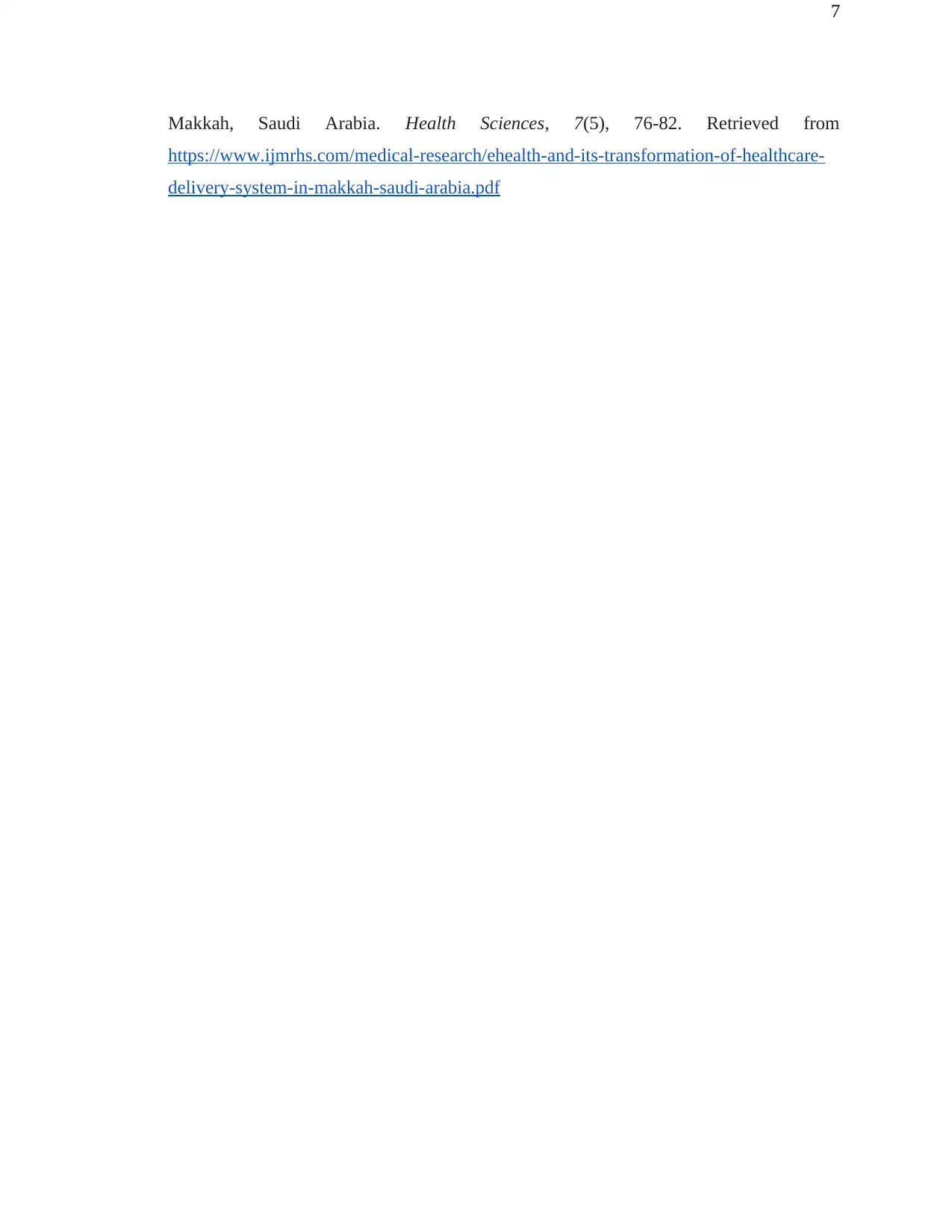
7
Makkah, Saudi Arabia. Health Sciences, 7(5), 76-82. Retrieved from
https://www.ijmrhs.com/medical-research/ehealth-and-its-transformation-of-healthcare-
delivery-system-in-makkah-saudi-arabia.pdf
Makkah, Saudi Arabia. Health Sciences, 7(5), 76-82. Retrieved from
https://www.ijmrhs.com/medical-research/ehealth-and-its-transformation-of-healthcare-
delivery-system-in-makkah-saudi-arabia.pdf
1 out of 7
Related Documents
Your All-in-One AI-Powered Toolkit for Academic Success.
+13062052269
info@desklib.com
Available 24*7 on WhatsApp / Email
![[object Object]](/_next/static/media/star-bottom.7253800d.svg)
Unlock your academic potential
Copyright © 2020–2026 A2Z Services. All Rights Reserved. Developed and managed by ZUCOL.





